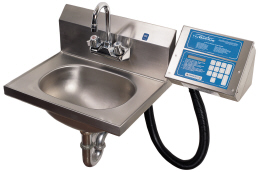To turn on the water, enter your employee ID number. Water flows for ten seconds and then shuts off. The digital display will instruct you to soap, lather, and scrub, allowing thirty seconds while it shows the countdown. Out of the faucet, warm water flows for fifteen seconds (the proper temperature to open pores and release bacteria) for you to rinse your hands—and then turns off again for you to dry—another five seconds. To log out, punch in your ID number again.

This is the
HyGenius automated hand washing management system designed for use in restaurants, hotels, hospitals, labs, and military foodservice environments in compliance with state health codes and regulations. It’s not outrageous looking; but rather a plain stainless steal box with a number pad and display on the front, it simply attaches to any existing hand sink. It’s an all-in-one system that ensures proper hand washing technique in compliance with the FDA, HAACP, OSHA, CDC standards and codes—using warm water, not hot, and scrubbing for fifteen seconds, not five. A seemingly great idea somebody thought. But for restaurant kitchens, it’s just a bad sci-fi episode waiting to happen.
For one thing, the entire washing cycle takes one minute, which can be costly for many cooks. It takes less than a minute for a sauce to break, an ice cream base to curdle, nuts to burn, and milk to boil over. A cook can make aioli, reduce a sauce, throw something on the burner, in the oven, or in the fryer, all in one minute. And when cooks lose three quarters of that minute to a little box that won’t spit out water because they haven’t lathered long enough, it won’t be long before they say, “Screw this,” while they find something else to wash their hands with, which is exactly what the cooks did at one particular restaurant in Detroit.
The executive chef at Restaurant X in Detroit attached the HyGenius system to every employee hand sink. Because employees entered their ID number into the system, it kept of log individual hand washes and produced a report at the end of the day (or week).
It also produces “wash-due” reminders “to ensure regular hand-washing by each user throughout the workday. Any time a person misses a hand wash where minimum frequency requirements (i.e. one wash per hour) are in place, an audible tone will sound and a built-in indicator light will flash while the system displays that person's ID number for prompt notification by management or co-workers,” their website says. Brilliant.

“What it actually does is discourage hand washing,” the corporate chef said. Additionally, if and when the system breaks down—which it did at one point—the water faucets cease to work, leaving cooks to wash their hands in the food sinks, which the chef admits is no better. “It’s just the worst thing ever,” he says. Don’t even ask him about the issue of touching the number pad again, after having washed your hands.
But the HyGenius management system can’t be that bad. Restaurants, like other food service business, should abide by some level of sanitation standard. There’s nothing wrong with a system that reduces the risk of bacteria-laden food. Restaurants, however, might not be the ideal environments for such an advanced automated system.
This mishap in Detroit raises an important point—the kitchen is a place that is just too fast, too unpredictable, and too volatile to be managed by anything else other than a human—the chef—even if it’s something as simple as hand-washing. It also unveils a stark disconnect between health inspectors, restaurant managers, and, now, equipment manufacturers to address the issue of public food safety. It’s logical that food safety standards must evolve to match the growth of the restaurant industry; some counties even require daily hand washing logs for its employees, hence the reason for HyGenius’s built in memory system. But there has to be another way. Regardless of the blast freezers, the pacojets, the cryovac machines, and the combi-ovens, the kitchen is still a work place where cooks are taught to use good judgment, despite innovative advanced machinery. And they should be given that liberty to practice it, despite what health inspectors think.